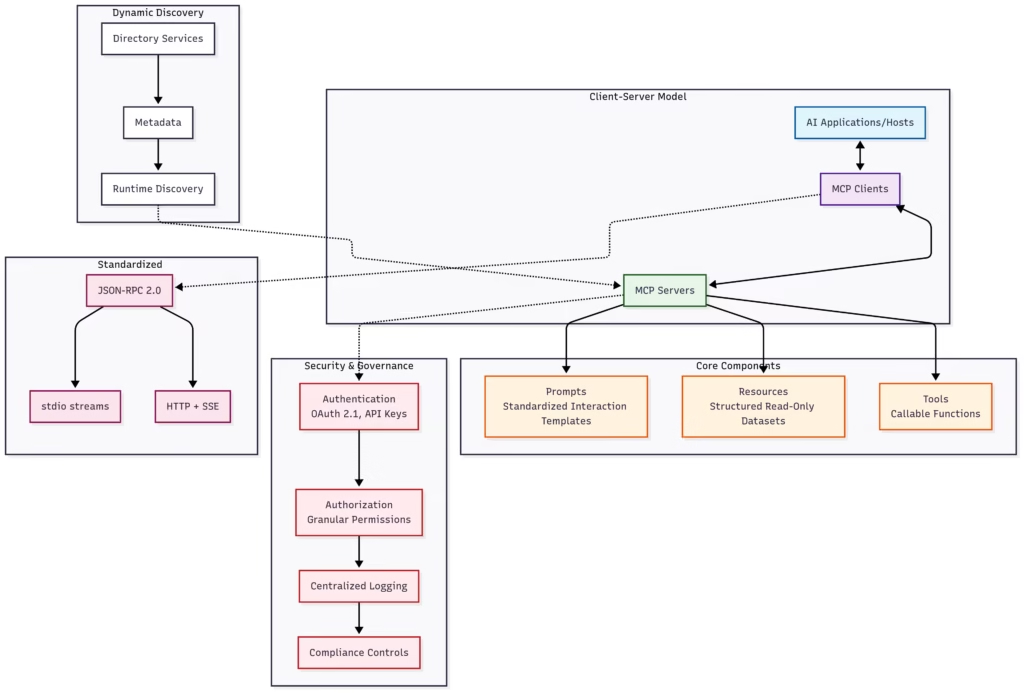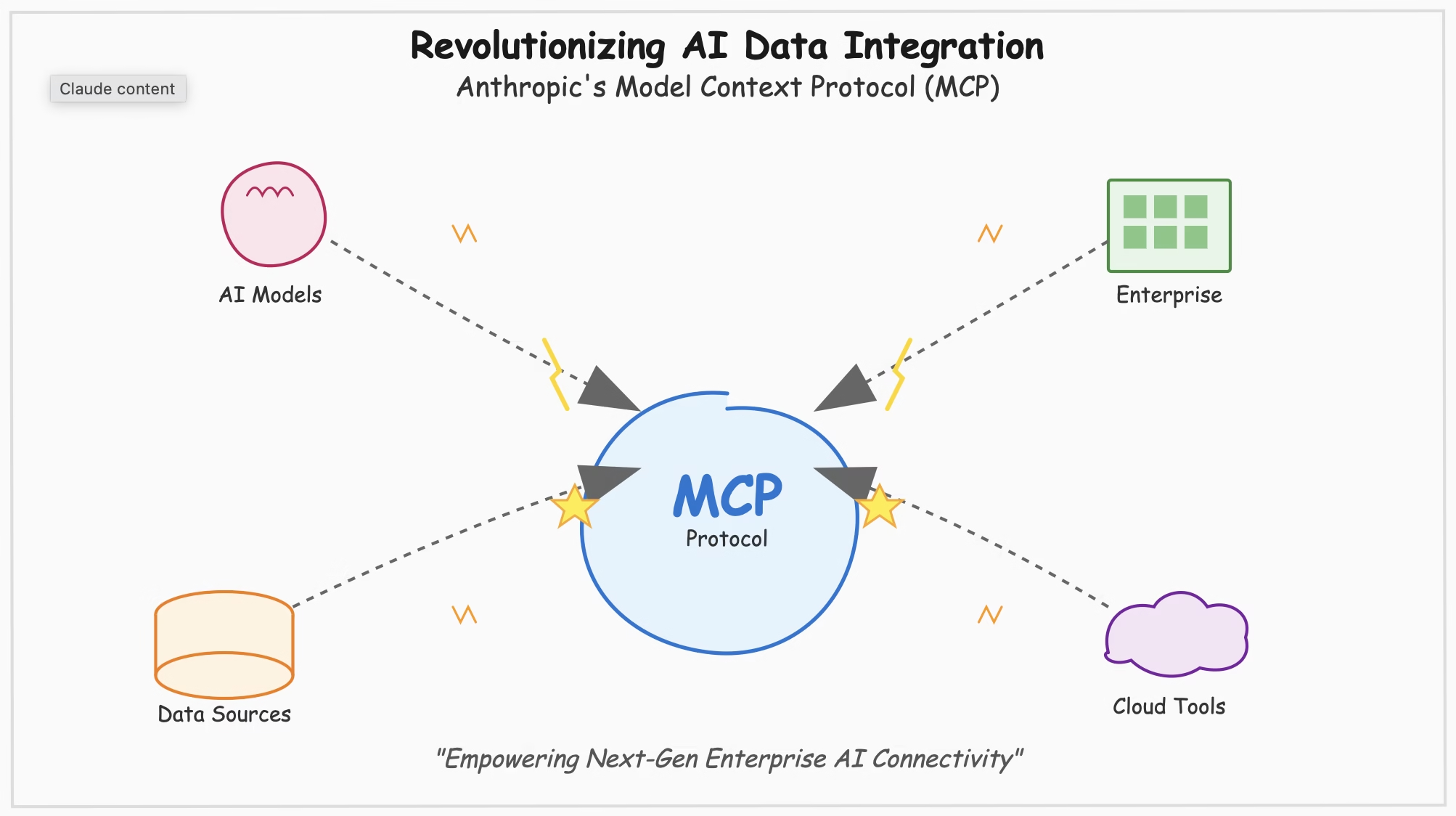Introduction to AI Data Integration and Its Growing Importance
Artificial intelligence (AI) data integration is fundamentally transforming how organizations gather, cleanse, transform, and unify data from diverse sources. By employing advanced AI-driven techniques—including generative AI and machine learning—businesses can automate data workflows, improve accuracy, and extract actionable insights in real time. According to Gartner, AI data integration platforms are projected to automate up to 80% of data integration tasks by 2025, leading to 40% higher data utilization and significantly faster decision-making.
As enterprises increasingly deal with vast data ecosystems, traditional integration approaches suffer from fragmentation, high maintenance overhead, and lack of scalability. This creates a pressing demand for standardized, efficient AI data integration solutions capable of handling multi-source, multi-format datasets dynamically and securely.
Anthropic’s Model Context Protocol (MCP): The “USB-C” for AI-Data Integration
What is MCP?
The Model Context Protocol (MCP), introduced by Anthropic, is an open-source standard that acts as a unified protocol for AI systems to seamlessly connect, communicate, and interact with diverse external data sources, tools, and business systems. MCP enables AI models—such as large language models (LLMs)—to access structured, real-time context from multiple platforms using secure, two-way connections, eliminating the need for custom, one-off connectors for each data source.
By functioning as a universal “USB-C port” for AI integration, MCP simplifies the complex multi-connection problem (M×N), where numerous AI models need to interact with a variety of enterprise data repositories, APIs, and applications.
Core Architecture and Features

- Client-Server Model: MCP implements a clean host-client-server framework. Hosts (AI applications) interact with MCP clients, which manage communication with MCP servers that expose data, tools, and prompts.
- Tools, Resources, and Prompts: These components define callable functions (tools), structured read-only datasets (resources), and standardized interaction templates (prompts) that AI models utilize for contextual insights.
- Dynamic Discovery: MCP supports automatic runtime discovery of available data sources and tools via directory services metadata, significantly reducing configuration overhead and enabling flexible scaling.
- Standardized Communication: Messaging leverages JSON-RPC 2.0 with transport options including HTTP with Server-Sent Events (SSE) or local stdio streams for varied deployment needs.
- Robust Security and Governance: MCP integrates a consistent framework with authentication (OAuth 2.1, API keys), granular authorization, explicit permissions, centralized logging, and compliance controls—critical for sensitive enterprise environments.
MCP’s Impact on AI Driven Data Integration
MCP enhances AI-based data integration by:
- Automating integration tasks and data contextualization in real time.
- Enabling seamless access to hundreds of disparate, structured, and unstructured data sources.
- Reducing manual data engineering by up to 70%.
- Accelerating data processing and AI decision-making workflows by 30-50%.
- Improving data accuracy through AI-enhanced cleansing and validation.
- Facilitating near real-time data insights and AI model inferences for enterprise applications.
Leading AI Data Integration Platforms Leveraging Generative AI and MCP
Several platforms exemplify the power of AI-powered data integration enhanced by MCP and generative AI:
- Informatica Intelligent Data Management Cloud: Integrates generative AI to automate data transformations and cleansing at scale with a 40% market share.
- SCIKIQ: Offers no-code AI-driven workflows and drag-and-drop interfaces supporting 100+ data sources and reducing integration costs by 80%.
- Fivetran: Cloud-native platform with AI-driven schema evolution, enabling seamless scaling and real-time data ingestion.
- Microsoft Azure Synapse Analytics: Combines big data and AI-powered analytics, enabling exabyte-scale integration with generative AI enhancements for real-time insight.
- IBM DataStage & Oracle Data Integration: Utilize AI for intelligent data mapping, IoT data integration, and multi-cloud synchronization with reduced operational overheads.
- AWS Glue & Google Cloud BigQuery: Serverless integration services enhanced with AI to optimize ETL workflows, reduce query latency, and lower costs by up to 40%.
- Matillion & DataRobot: Platforms focusing on AI-enhanced ETL automation and predictive analytics for enterprise-scale deployments.
Real-World Use Cases of MCP and AI Data Integration
Software Development Acceleration
AI assistants connected via MCP to platforms like GitHub, Slack, and Jira enable contextual code generation, automated debugging, and real-time project status updates—dramatically improving developer productivity and software quality.
Enterprise Knowledge Management
MCP enables unified access to internal wikis, documentation repositories, and FAQ systems. This reduces employee search times and improves decision-making with accurate AI-driven content delivery.
Customer Support Automation
AI-powered chatbots integrated through MCP gain access to CRM data, product knowledge bases, and support tickets, enabling personalized responses and faster issue resolution, enhancing customer satisfaction while reducing operational costs.
Business Intelligence and Data Analytics
MCP supports natural-language AI queries across BI platforms and databases, democratizing data access for non-technical users and accelerating actionable insight generation across enterprises.
The Future of MCP: Towards a Universal AI Integration Standard
Industry Momentum and Support
The MCP ecosystem is rapidly expanding, with industry leaders OpenAI, Microsoft, and Amazon incorporating MCP support in their products. OpenAI’s Agents SDK and Microsoft’s Playwright-MCP server exemplify growing adoption, enabling sophisticated AI agents capable of complex web interactions under MCP.
Ongoing Enhancements
- Adoption of OAuth 2.1 for enhanced security.
- Introduction of streamable HTTP transport and JSON-RPC batching for improved performance.
- Rich tool annotations supporting AI reasoning and discovery.
- Prospective integration with privacy vaults and compliance automation modules.
Competitive Landscape
While OpenAI pursues proprietary models, MCP’s open-source philosophy encourages community collaboration and vendor neutrality, positioning it as a potential universal standard for scalable AI data governance and integration.
Challenges Ahead
- Widespread enterprise adoption requires ecosystem maturity and broad vendor participation.
- Initial learning curve and server implementation complexity remain notable hurdles.
- Balancing performance trade-offs against specialized traditional APIs necessitates hybrid integration strategies.
Key Takeaways for AI Practitioners and Enterprise Architects
- AI data integration via MCP revolutionizes how AI systems connect with enterprise data, dramatically reducing manual effort and accelerating insights.
- Standardized, secure, and scalable MCP architecture provides a robust foundation for AI-driven workflows across multiple industries.
- Generative AI and AI-powered platforms are transforming ETL, schema management, and real-time analytics, unlocking previously inaccessible value.
- Enterprises should consider phased MCP adoption, starting with key data sources and expanding to enable dynamic, context-aware AI applications.
- Staying informed on MCP ecosystem developments and engaging with open-source communities can maximize AI integration success and innovation.
Learn More and Take Action
- Explore MCP specifications and SDKs on Anthropic’s official MCP site.
- Discover hundreds of MCP servers and development tools at MCP.so.
- Investigate AI-driven data integration platforms like Informatica, SCIKIQ, and DataRobot for enterprise-grade solutions.
- Contact expert vendors to plan your AI data integration strategy with MCP at C3 AI.

